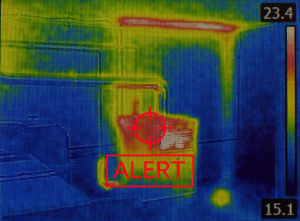NDAA compliance isn’t the first thing that comes to mind when looking for industrial video monitoring solutions, is it? Yet, a non-compliant video monitoring system can have massive implications for your security and revenue.
What Is the NDAA and What Does it Mean to Be NDAA Compliant?
NDAA compliance is related to the National Defense Authorization Act, a U.S. policy that regulates certain technologies originating from specific countries. This stipulation aims to secure the United States’ national security from potential espionage threats.
In industrial video monitoring, NDAA compliance holds significant implications for procurement processes and the overall security structure. It ensures the use of trusted sources with a low risk of being compromised.
Too much legalese?
The National Defense Authorization Act is designed to make sure no one can spy on your business through technology. Spyware has national security consequences, which means some brands are specifically prohibited from selling to American consumers and businesses.
It may sound like this national security stuff doesn’t impact you, but non-compliant video monitoring systems pose a risk to your business.

Who Needs NDAA-Compliant Industrial Video Monitoring Systems?
The short answer: everyone.
The biggest reason to opt for an NDAA-compliant video monitoring system is that, without it, you cannot access any federal funding. This can translate to substantial business losses and hamper growth in the long run. For industrial organizations in particular, where large and valuable contracts are the norm, this could be a tricky pitfall to navigate.
If you’re thinking: “We don’t want federal contracts and we run a sawmill, what could they possibly want to spy on?”, you need to know this isn’t only about spying.
Non-compliant cameras can be attacked and the hackers can use them to gain access to their entire video monitoring system. They can shut down the cameras just because it’s…fun for them.
Before that happens, it’s important to understand the importance of securing every piece of equipment in an industrial environment.
The number of data breaches and exposed digital records in the U.S. has consistently exceeded 1 billion between 2015 and 2019. Why the drop in breaches in 2019? That’s when the NDAA Compliance Act was passed.
We cannot emphasize this enough: NDAA-compliant technology is crucial for industrial environments.
Now let’s see how you can make sure that your equipment is compliant and that your business is both eligible for federal funding and safe from cyberattacks.
How Can You Make Sure Your Video Monitoring System Is NDAA-Compliant?
The first thing you need to do is look for the list of NDAA-prohibited manufacturers. This list is a good starting point, but please note that new manufacturers are constantly added to it, so this will require ongoing research.
Your safest bet is working with a manufacturer based in the U.S. However, you also need to make sure that they don’t use OEM (original equipment manufacturer) components that come from NDAA-prohibited manufacturers.
Yes, things are a bit more complicated and you will need to track not just the manufacturer of the system itself but the OEM parts as well.
When in doubt, ask the seller or manufacturer directly. Or make sure that your preferred seller is NDAA-compliant.
Want to be 100% sure that your industrial video monitoring system is NDAA compliant and that you won’t run into any legal, financial, or cybersecurity problems? Almost all of Opticom’s products are NDAA compliant. We’ve been in the industrial video monitoring business for more than five decades, and we couldn’t have made it that far without taking our compliance and our customers’ safety and security seriously.
Almost all of our monitoring system components are NDAA compliant, from the cameras themselves to the monitors and mounts.
Moreover, at Opticom we don’t sell generic solutions. We make sure that the systems you buy are a perfect fit for your environment and your needs. The industrial cameras that fit the needs and can withstand the risks of a sawmill won’t work in a food processing plant and vice versa.
If you’re looking for an industrial video monitoring system that’s secure, NDAA compliant, and matches your needs to a T, reach out to our consultants. We’d be happy to help you configure a customized system!







